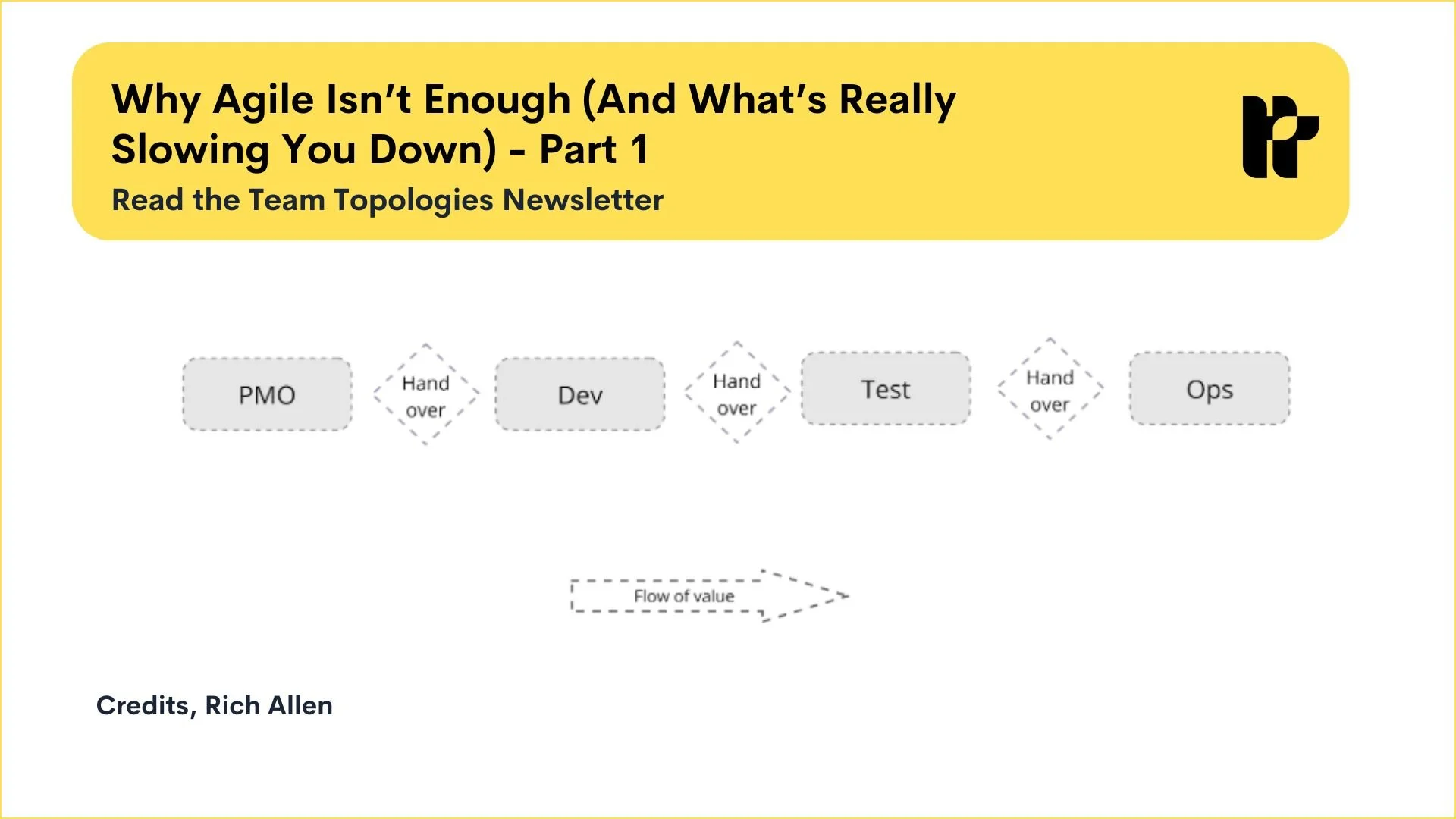Newsletter ( OCTOBER 2025): Moving Beyond Agile Rituals – Designing the Whole Organization for Fast Flow
This is part 1 of a 3-part newsletter series on "Team Topologies in Action".
For organizations facing critical structural bottlenecks or striving for radical business agility, the solution requires fundamentally reshaping how teams are organized around value delivery, managing both the complexity and the cognitive load placed on people. The core question must shift from, "Are we doing Agile right?" to, "Are we organized in a way that supports flow?".
Structural friction: the need for holistic organizational redesign
The friction that slows delivery sits beneath the surface, determined by how responsibilities are divided and the number of interactions required to get something done. In teams where ownership is shared or unclear, features may be shipped, but the overall outcomes often aren't achieved.
The second edition of Team Topologies reflects this evolution, underscoring the need to organize business and technology for the fast flow of value. This means moving from viewing the organization as an "efficient machine" to seeing it as a "flourishing ecosystem" designed to support internal providers and promote active knowledge diffusion. Organizations succeeding in rapid change move fast while remaining deeply human.
Case studies: holistic organizational transformation
The following organizations adopted Team Topologies as a blueprint for foundational change, driving structural transformation across business and technology domains using fast flow and cognitive load limits as core design tenets.
EBSCO: From fragmentation to focused stewardship
EBSCO Information Services, a major research database provider, found its existing Scaled Agile Framework (SAFe) structure was failing due to complex challenges related to growth. Teams were fragmented, dependencies multiplied, and high cognitive load affected morale and productivity. EBSCO recognized that incremental improvements would not solve these structural issues.
Key Action: EBSCO partnered with Conflux (led by the co-author of Team Topologies, Matthew Skelton) to redesign their organization, shifting the mindset from service "ownership" to ongoing "stewardship," which emphasizes continuous care and evolution of services to meet changing customer needs. The transformation followed a methodical, two-phase approach: Domain Definition (aligning capabilities into Enterprise Domains) and Flow Optimization (streamlining ownership). The design ensured platforms were viewed as curated experiences to reduce cognitive load rather than adding complexity.
Resulting Impact: This structural focus delivered substantial, measurable benefits, including a 26% decrease in feature cycle time and a 76% reduction in Priority 1 and 2 enterprise incidents over a two-year period. Critically, development managers reported that they felt they had much less cognitive load, which increased job satisfaction.
Telenet: Modular architecture for whole-organization agility
Telenet, a large European telecoms operator, found that while their initial Agile practices increased transparency, coordination costs and cognitive load were increasing exponentially because business capabilities were spread across organizational boundaries.
Key Action: Telenet undertook a whole-organization transformation using a combination of Team Topologies, Domain-Driven Design (DDD), and Wardley Maps to create a new fast-flow operating model. They established modular Tribe Archetypes that transcended traditional departments: Customer Tribes (focused on customer mission), Platform Tribes (managing common internal platforms), and Enterprise Tribes (driving horizontal alignment).
Key Principle: The adoption applied flow-based design to the entire organization, including non-software contexts like HR and Finance. This modular architecture empowers tribes with all capabilities needed (business, IT development, operations) and allows the organization to adapt rapidly—splitting, adding, or merging tribes based on strategic goals without having to redesign the entire enterprise architecture.
Capra Consulting: Leadership-as-a-Service and distributed ownership
Capra Consulting, a rapidly growing IT consultancy, faced a challenge maintaining its core value that every employee should have a voice as the organization scaled. The traditional hierarchy led to the centralized management team becoming a decision-making bottleneck, increasing cognitive burden and waste.
Key Action: Capra sought to transform into a network-centric organization to distribute ownership and increase autonomy. They used Team Topologies concepts to identify internal value streams (Recruiting colleagues, Building competency, Selling and delivering services) and clarify responsibilities through Team APIs. They took the bold step of dissolving the centralized management team.
Key Principle: This process demonstrated the application of Team Topologies patterns—such as the "leadership-as-a-service" approach—to the knowledge work involved in running an entire organization, not just IT.
Resulting Impact: The reorganization led to improved employee engagement (from 8.2 to 8.4) and high levels of individual and team autonomy.
The journeys undertaken by EBSCO, Telenet, and Capra Consulting confirm that achieving holistic business agility requires more than just adopting Agile rituals; it demands a deep commitment to structural and cultural evolution based on the principles of fast flow and managed cognitive load. Transformation at this scale is not a one-time event but requires continuous adaptation and refinement.
Achieving holistic transformation across an entire enterprise requires leaders and teams to be equipped with structured, actionable knowledge and proven patterns. To ensure your organization has the deep understanding needed to design resilient team structures and foster continuous learning at scale, explore our resources designed for enterprise-wide knowledge adoption.
Next on the newsletter
Part 2- Strategic platformization and cognitive load management with Adidas, Trade Me, Singapore GovTech, Creditas
Part 3- Value stream optimization and continuous agile evolution with KFC UK&I, Yassir, ING Netherlands
Was this newsletter useful? Please share your thoughts on how we can make it better. Send us an email.












